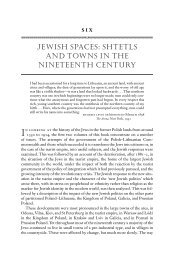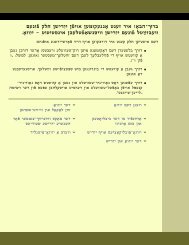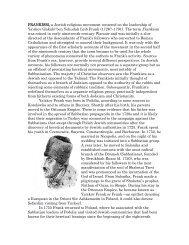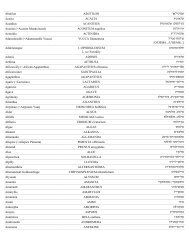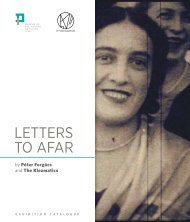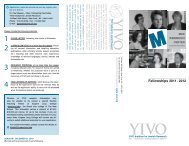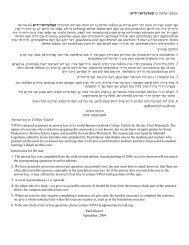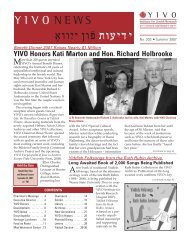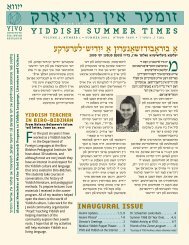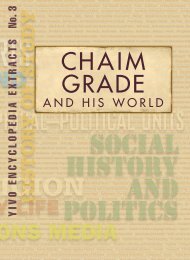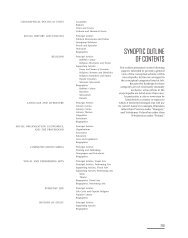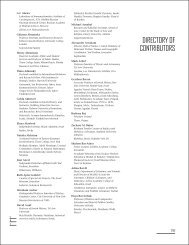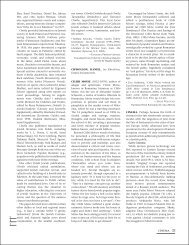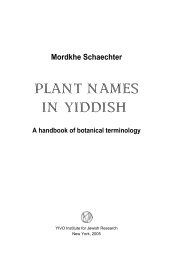Hebrew literature - YIVO Institute for Jewish Research
Hebrew literature - YIVO Institute for Jewish Research
Hebrew literature - YIVO Institute for Jewish Research
Create successful ePaper yourself
Turn your PDF publications into a flip-book with our unique Google optimized e-Paper software.
S<br />
R<br />
L<br />
thology Kol agadot Yisra’el (All the Legends<br />
of Israel; 1900–1912).<br />
Lubetzky, YitsÕak (Turets, Minsk region,<br />
1872–Vienna, 1921), writer, critic,<br />
musician, and Zionist activist. Lubetzky’s<br />
critical reviews were published in the <strong>Hebrew</strong><br />
and Yiddish press at the turn of the<br />
twentieth century.<br />
Luboshitzky, Aharon (Ruzhany, Grodno<br />
region, 1874–died in Warsaw ghetto,<br />
1942), poet, educator, author of textbooks,<br />
and Zionist campaigner. He was<br />
also involved in children’s <strong>literature</strong> and<br />
newspapers.<br />
Markel-Mosessohn, Miryam (SuwaËki,<br />
Pol., 1837–Grajewo, Pol., 1920), maskil<br />
and translator. Markel-Mosessohn was involved<br />
with the Ha-Melits newspaper and<br />
corresponded with Yehudah Leib Gordon<br />
and Mosheh Leib Lilienblum.<br />
Meidanik, Eliyahu (Kiev region, 1882–<br />
Odessa, 1904), short-story writer. Meidanik’s<br />
work was first published in the<br />
Russian journal Voskhod when he was<br />
only 13; he also wrote a few stories in Yiddish.<br />
His <strong>Hebrew</strong> stories were published<br />
mainly in the Ha-ShiloaÕ monthly (receiving<br />
glowing reviews from Ahad Ha-<br />
Am and Bialik). Following his suicide as a<br />
reaction to the Kishinev pogrom, his<br />
works were collected and published in<br />
1908.<br />
Meitus, Eliyahu (Kishinev, 1892–Israel,<br />
1977), poet. Beginning in 1910, Meitus<br />
published poems, poetry anthologies, and<br />
recorded impressions; he also translated<br />
works from Russian, French, Romanian,<br />
and Yiddish into <strong>Hebrew</strong>. He contributed<br />
to Yiddish periodicals in Kishinev,<br />
Czernowitz, New York, and Tel Aviv, living<br />
in Bessarabia and Romania from 1921<br />
and moving to Palestine in 1935.<br />
Meltzer, Shimshon (TËuste, Galicia,<br />
1909–Tel Aviv, 2000), poet and translator.<br />
Early in his career, Meltzer was active in<br />
the <strong>Hebrew</strong> press in Poland. He translated<br />
into <strong>Hebrew</strong> Y. L. Peretz’s Yiddish writing,<br />
published in a 20-volume edition, as well<br />
as numerous works of Yiddish <strong>literature</strong>,<br />
folklore, and criticism. He lived in Palestine<br />
from 1933.<br />
Mezah, Yehoshu‘a (Shat, Kovno region,<br />
1834–Vilna, 1917), prolific <strong>Hebrew</strong> journalist<br />
and essayist in the latter half of the<br />
nineteenth century. Mezah wrote more<br />
than 600 booklets in Yiddish, mostly<br />
translations and adaptations of popular<br />
stories from Russian and <strong>Hebrew</strong>.<br />
Mohr, Avraham Mendel (Lwów, 1815–<br />
Lwów, 1868), Galician maskil. Mohr published<br />
numerous popular history and geography<br />
books, both original and in<br />
translation. A champion of the Yiddish<br />
language, he translated works from <strong>Hebrew</strong><br />
into Yiddish and published Yiddish<br />
newspapers in Lwów.<br />
Neimanowitz, Naftali Herts Yehudah<br />
(Józefów, Lublin region, 1843–Warsaw,<br />
1898), journalist and writer. He is known<br />
mainly <strong>for</strong> his extremely humorous feuilletons,<br />
which, beginning in 1866, regularly<br />
appeared in the newspaper Ha-<br />
Tsefirah under the alias Ha-Nets (The<br />
Hawk). He also contributed to the Warsaw<br />
Yiddish press and wrote several books<br />
in Yiddish.<br />
Netan’eli-Rotmann, Ya‘akov (Brody,<br />
1892–Tel Aviv, 1962), educator and Zionist<br />
activist. Netan’eli-Rotmann wrote poetry<br />
and recorded his impressions of education<br />
and culture. He was editor of Ha-<br />
Solel, a monthly published in Lwów<br />
(1933–1934) be<strong>for</strong>e moving to Palestine<br />
in 1935.<br />
Nevachovich, Yehudah Leib (Letichev,<br />
Podolia region, 1776–Saint Petersburg,<br />
1831), among the first Russian maskilim.<br />
Nevachovich wrote (originally in<br />
Russian) the pioneering work Kol shav‘at<br />
bat Yehudah (The Crying Voice of the<br />
Daughter of Judah; 1804), dealing with<br />
Russian antisemitism. He became a Lutheran<br />
about 1809.<br />
Pines, NoaÕ (Shklov, Mogilev region,<br />
1871–Tel Aviv, 1939), poet and educator.<br />
Pines began his career at the end of the<br />
nineteenth century as a <strong>Hebrew</strong> poet.<br />
Later he was involved in innovative pedagogic<br />
activities, including writing textbooks<br />
and editing anthologies. He lived<br />
in Russia and moved to Palestine in 1919.<br />
Piurko, Avraham Mordekhai (ÊomÛa,<br />
1853–Grajewa, Pol., 1933), teacher and<br />
writer of children’s <strong>literature</strong>. Piurko<br />
founded the weekly Gan sha‘ashu‘im<br />
(1899), the first <strong>Hebrew</strong>-language children’s<br />
newspaper outside Palestine. He<br />
contributed to Yiddish periodicals in<br />
Odessa, St. Petersburg, and Warsaw and<br />
published memoirs about Yiddish and<br />
<strong>Hebrew</strong> writers in the Warsaw journal<br />
Haynt.<br />
Rabinowitz, Leon (Berestovitz, Grodno<br />
region, 1862–Leningrad, 1938), <strong>Hebrew</strong><br />
and Yiddish journalist and editor, researcher,<br />
inventor, and Zionist activist.<br />
Rabinowitz was the last editor (1893–<br />
1904) of Ha-Melits (The Advocate); he also<br />
edited and contributed to a number of<br />
Yiddish periodicals in St. Petersburg,<br />
Vilna, Warsaw, and New York.<br />
Rall, Yisra’el (Brody, 1830–Lwów, 1893),<br />
translator and publisher. Rall was among<br />
the first to translate Roman <strong>literature</strong><br />
(e.g., Ovid, Lucretius, Horace) into <strong>Hebrew</strong><br />
during the Haskalah period. He also<br />
published the Lwów-based journal Shem<br />
ve-Yafet (1887–1888).<br />
Rodin, Elisha‘ (Mstislavl, Mogilev region,<br />
1888–Moscow, 1946), poet. Rodin<br />
began as a Yiddish poet but at the end of<br />
the 1920s switched to <strong>Hebrew</strong>, as a result<br />
of which he was imprisoned <strong>for</strong> a number<br />
of years. He was the last <strong>Hebrew</strong> poet in<br />
Soviet Russia.<br />
Rozenfeld, Aharon (Berestechko, Volhynia<br />
region, 1846–Bachmut, Ukraine,<br />
1916), poet and short-story writer. He<br />
helped edit Ha-Yom, the first <strong>Hebrew</strong><br />
daily (1886), and was author of the pioneer<br />
children’s reader Gan sha‘ashu‘im<br />
(Playground; 1880 and onward).<br />
Rubin, Shelomoh (Dolina, Galicia,<br />
1823–Kraków, 1910), Galician maskil.<br />
Prolific writer in diverse fields of <strong>Jewish</strong><br />
studies. Rubin researched folklore, popular<br />
<strong>literature</strong>, mysticism, <strong>Hebrew</strong> language,<br />
and <strong>Jewish</strong> philosophy.<br />
Sadan, Dov (Brody, 1902–Jerusalem,<br />
1989), writer, critic, journalist, translator,<br />
and researcher of <strong>literature</strong>, language,<br />
and folklore. Living in Palestine from<br />
1925, Sadan (Shtock) chaired the Yiddish<br />
Department at the <strong>Hebrew</strong> University, Jerusalem.<br />
One of the greatest experts and<br />
scholars of <strong>Jewish</strong> studies, he cultivated<br />
the rich East European <strong>Jewish</strong> heritage in<br />
all its variety.<br />
Samuely, Natan Note (Stryj, Galicia,<br />
1843–Baden, near Vienna, 1921), writer<br />
and Zionist activist. Samuely wrote poems<br />
and short stories based on <strong>Jewish</strong> experiences<br />
in Galicia; he lived mostly in<br />
Lwów.<br />
Shapira, Sarah (dates unknown), one<br />
of the few <strong>Hebrew</strong> female poets of the<br />
nineteenth century. Daughter of a rabbinical<br />
family from Czortków (Chortkiv),<br />
Shapira corresponded with Yehudah Leib<br />
Gordon. She is known primarily <strong>for</strong> her<br />
Zionist poem Al tal ve-al matar (No Dew<br />
Nor Rain; 1888).<br />
Sirkis, Yisra’el Yosef (Borschev, Podolia<br />
region, 1860–Kishinev, 1928), short-story<br />
writer and playwright. Beginning in the<br />
HEBREW LITERATURE 707<br />
MS3



